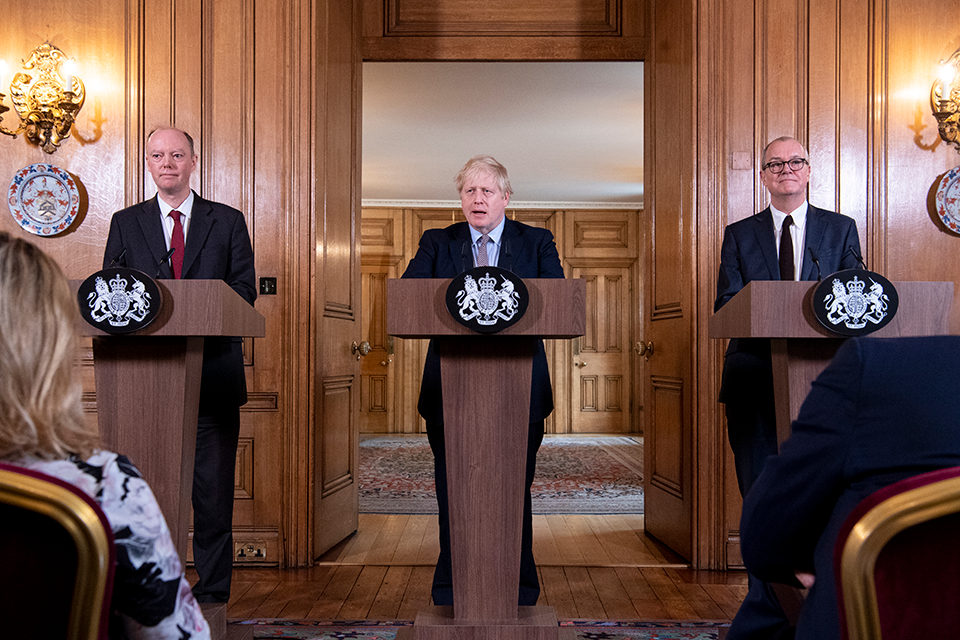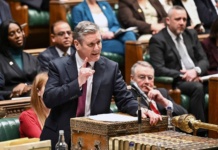
UK Prime Minister, Boris Johnson at the 11 May 2020 Downing Street press conference on coronavirus set out plans to ease the lockdown, and begins to allow people to return to their way of life.
Boris Johnson said: First of all, I want to update you on the latest data in our fight against coronavirus. I can report through the Government’s on-going testing and monitoring programme that, as of today:
- 1,921,770 tests for coronavirus have now been carried out in the UK, including 100,490 tests carried out yesterday;
- 223,060 people have tested positive, that’s an increase of 3,877 cases since yesterday;
- 11,401 people are currently in hospital with coronavirus, down from 11,768 the previous day.
- And sadly, of those tested positive for coronavirus, across all settings, 32,065 have now died. That’s an increase of 210 fatalities since yesterday. This figure includes deaths in all settings not just in hospitals.
Before we begin questions from the public and from the media I just want to remind people of a number of important things I said in my address to the nation last night.
First, in order to monitor our progress, we are establishing a new COVID Alert Level System. The COVID Alert Level has five levels, each relating to the level of threat posed by the virus. The level will be primarily determined by the R value and the number of coronavirus cases. In turn, that COVID Alert Level will determine the level of social distancing measures in place. The lower the level the fewer the measures; the higher the level the stricter the measures.
Throughout the period of lockdown which started on March 23rd we have been at Level 4, meaning a Covid19 epidemic is in general circulation, and transmission is high or rising exponentially. Thanks to the hard work and sacrifices of the British people in this lockdown, we have helped to bring the R level down and we are now in a position to begin moving to Level 3, in steps.
And we have set out the first of three steps we will take to carefully modify the measures, gradually ease the lockdown, and begin to allow people to return to their way of life – but crucially while avoiding what would be a disastrous second peak that overwhelms the NHS.
After each step we will closely monitor the impact of that step on the R and the number of infections, and all the available data, and we will only take the next step when we are satisfied that it is safe to do so.
Step 1 – from this week:
- Those who cannot work from home should now speak to their employer about going back to work.
- You can now spend time outdoors and exercise as often as you like.
- You can meet one person outside of your household outside (outdoors), provided you stay 2 metres apart. The social distancing measures remain absolutely crucial to us keeping the infection rate and the number of cases down as low as we possibly can.
Step 2 – from June 1, at the earliest, as long as the data allows, we aim to allow:
- Primary schools to reopen for some pupils, in smaller class sizes;
- Non-essential retail to start to reopen, when and where it is safe to do so;
- Cultural and sporting events to take place behind closed doors, without crowds.
And then Step 3 – no earlier than July 4, and again, only if the data says it safe, we aim to allow:
More businesses and premises to open, including potentially those offering personal care such as leisure facilities, public places, and places of worship. Many of these businesses will need to operate in new ways to ensure they are safe, and we will work with these sectors on how to do this.
So, given we have taken the first step in carefully adjusting some of the measures today, and therefore our advice to people on what to do, we have also updated our messaging. We are now asking people to Stay Alert, Control the Virus and Save Lives.
Yes – staying alert, for the vast majority of people, still means staying at home as much as possible. But there are a range of other actions we’re advising people to take as we modify measures.
People should Stay Alert, by:
- working from home if you can;
- limiting contact with other people;
- keeping distance if you go out – 2 metres apart where possible;
- washing your hands regularly;
- wearing a face covering when you are in enclosed spaces where it’s difficult to be socially distant – for example in some shops and on public transport;
- and if you or anyone in your household has symptoms, you all need to self-isolate.
Because if everyone stays alert and follows the rules, we can control coronavirus by keeping the R down and reducing the number of infections. This is how we can continue to save lives, and livelihoods, as we begin as a nation to recover from coronavirus.
Kindly follow us on twitter:@AfricanVoice2









